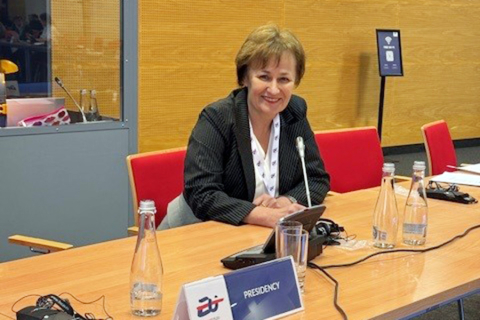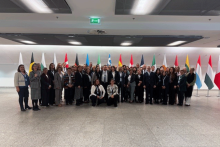The meeting “Are medical staff the only antidote to our problems in the health care system” was attended by 120 people, including Health Minister Izabela Leszczyna and Prof. Urszula Demkow, Undersecretary of State at the Ministry of Health, as well as representatives of the World Health Organization (WHO) and the Directorate-General for Health and Food Safety (DG SANTE), also representatives of international professional organizations of nurses and midwives as well as Polish professional organizations of doctors and dentists, nurses and midwives.
The purpose of the meeting was to discuss difficulties in the training of medical personnel in regulated professions and in the practice of medicine and dentistry, nursing and midwifery. They are faced by both Poland and Europe. They also discussed methods developed by our country to deal with the shortage of medical specialists, including increasing the number of students in medical faculties. Experts from other EU countries responsible for medical personnel policy had the opportunity to exchange their experiences in this regard.
Pediatric dentistry as a priority specialization
Prof. Dorota Olczak-Kowalczyk, Head of the Department of Pediatric Dentistry MUW, as well as national consultant in pediatric dentistry and president of the Polish Society of Pediatric Dentistry, gave a lecture at the meeting on the role of the pediatric dentist in improving oral health.
In Poland, the prevalence of caries doubles between the ages of 3 and 18 (to over 93%) and is higher compared to the prevalence in many European countries. The rates of caries in permanent teeth are similarly high. The disease is associated with a significant socioeconomic burden and health costs. Given the unfavorable age structure of specialists, the need to train dentists focused on pediatric care is becoming one of the priorities of the health care system. During the discussion, among other things, system changes introduced in Poland in the field of dental care were discussed, including the organization of school dental care. It was emphasized that the increase in the number of pediatric dentists from 0.68 to 0.98 in 2015-2025 is associated with an increase in treatment and a decrease in the rate of untreated caries complications, especially of deciduous teeth. In addition, the need to increase the availability of free dental care provided in dental surgeries for children and adolescents, especially in rural regions, and the availability of pediatric dental specialists were discussed discussed.
Challenges of educating medical professionals
The sessions devoted to nurses and midwives were opened by Dr. Mariola Głowacka, NCU Prof., Vice Rector for the NCU Medical College, member of the Presidium of the Supreme Council of Nurses and Midwives. She gave a presentation on the directions of changes in the education and practice of nursing and midwifery as well as the search for common European solutions. WHO and DG SANTE presented the plan for European Nursing Action 2024-2027. In addition, there was a discussion with key partners representing the nursing community on the problems of this professional group in the EU in the broader context of the medical workforce.
The panel on medical education featured Prof. Mariusz Klencki, Director of the Department of Medical Personnel Development at the Ministry of Health, who gave a lecture on whether the system of training doctors could be a source of shortages of medical staff. Among the topics discussed during the debate was the modular specialization training system, introduced in Poland 10 years ago, which, on the one hand, shortened the period needed to fully train a specialist, while on the other hand, resulted in a narrowing of doctors' competencies. The need to strengthen the quality of training in basic modules and to verify the effects of this training was therefore pointed out. They also spoke about access to medical personnel in different regions of our country as well as the relationship between the place of study and the subsequent practice of the profession.
Based on the materials from the website polish-presidency.consillum.europa.eu

